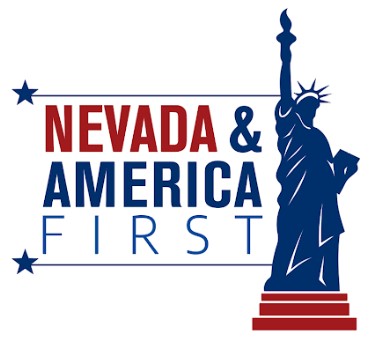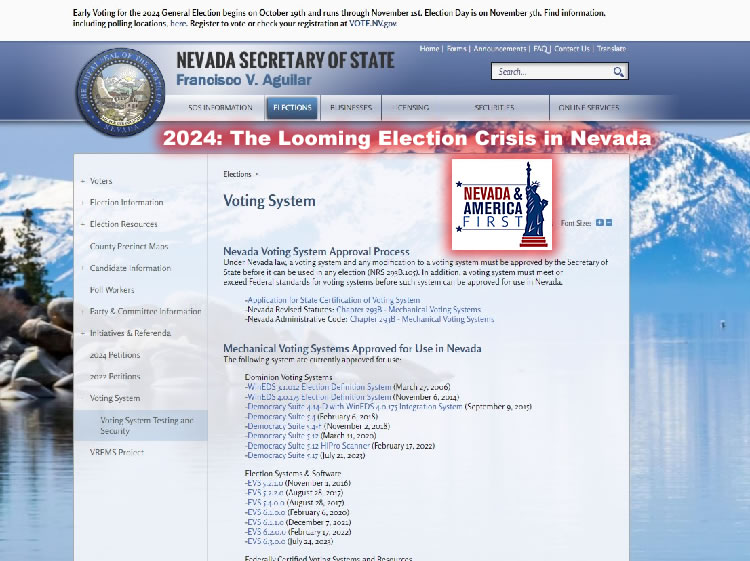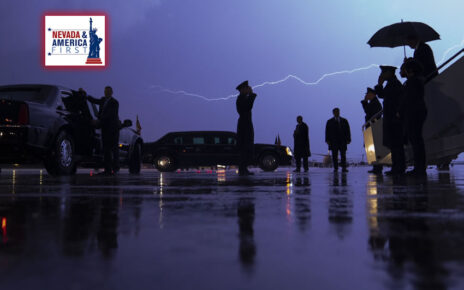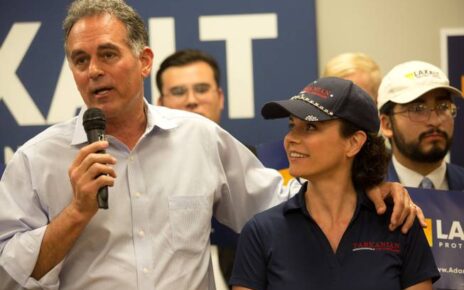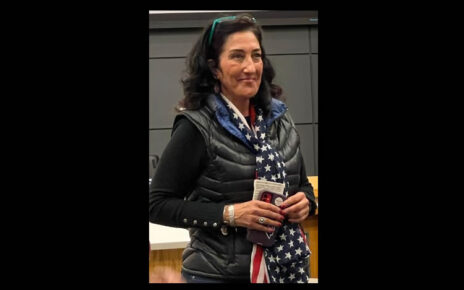The Looming Election Crisis in Nevada
On Friday, October 11, 2024, while President Donald J. Trump spoke at the Grand Sierra Resort, Professor Ed Solomon proved an algorithm embedded in the election management system manipulates elections in America and in Nevada in front a packed room at Boomtown Casino-Hotel in west Reno.
Solomon offered his root assessment of the situation at time 1h 24m 32s:
…a constitutional crisis …we have unobservable and unverifiable digital elections that are incompatible to the guarantee clause of the Constitution.
Solomon made the following claim at time 41m 46s:
“I don’t have a victory slide like I do in Colorado to show your elections
are being rigged. Nevertheless, I can show you with the same
mathematical precision and certainty that your elections are being
rigged.”
Understanding the Situation
Trouble started after the July 2024 primary in Washoe County when candidates Mark Lawson for County Commission and Paul White for School Board Trustee contested the results, a recount was performed by the Registrar of Voters, and the Board of Commissioners then delayed certification by a 3-2 vote. Why they delayed is very much the issue to be discussed. Deputy District Attorney Nathan Edwards instructing the County Commission Board on their right to delay:
However, irrespective of the concerns of Board members, Nevada’s Secretary of State Francisco Aguilar sued three of the commissioners: Clara Andriola, Mike Clark, and Jeanne Herman, to immediately certify the recounts, or face potential criminal charges. As a result, the Board approved certification of the recounts. Case closed.
But then, the Secretary accused Washoe County Commissioners of intending to “disenfranchise Nevada voters, delegitimize Nevada’s elections,” in an extraordinary petition to re-open a moot case. Aguilar v. Commissioners Andriola, Clark, and Herman, Nevada Supreme Court, Case No. 88965, Document No. 24-27104. The Secretary opined on the “threat of rogue county commissioners flouting their ministerial duty to canvass elections results.” He said it was his duty and the court’s to “avoid catastrophic disruption in the general election.”
The Nevada Supreme Court disagreed and denied the Secretary’s petition but left the door open for the Secretary to pursue future litigation.
Every election official in Nevada now lives in fear of stepping out-of-line by getting sued and accused of criminal conduct by Secretary Aguilar.
Going into the most important election of our lifetime, with substantive evidence having been presented proving elections are controlled by algorithms being ignored by the Secretary, there’s never been a more important issue than a public official’s right to vote their conscious to delay or deny certification of any election and/or to inspect the election system or modes of implementation of the system.
This is the constitutional crisis referred to by Ed Solomon that we all need to be concerned about.
How Did We Get Here?
We must go back to the Washoe County Board of Commissioners’ meeting of June 25, 2024, wherein former Nye County Clerk, Mark Kampf, presented his summary of hand-counting the 2022 general election in Nye County. Mr. Kampf lauded the accuracy of hand-counting and decried the scurrilous lawfare posed by the ACLU that impeded his ability to do a complete hand-count.
In the June 25 meeting of the Board, Commissioner Clara Andriola said:
“But again, there’s nothing statutorily in place right now that would prevent that self-audit. And putting in these checks-and-balances, creating a statistical process, and having the confidence level, the percentage, as high as possible, that, that to me is a huge, huge opportunity to start building the trust that needs to be put into place.”
In the July 9, 2024 meeting of the Board, the alleged due date for certification of the recounts of county School Board Trustee and County Commissioner races, evidence of algorithmic manipulation of elections was presented by Mr. Robert Beadles, relying on the work of Ed Solomon and ChatGPT analysis. Mr. Beadles followed up his public comments with email messages to the county and state officials, attaching his filed Election Integrity Violation Reports that included such detail as:
- The Non-Partisan-Styled Ballots that replaced the destroyed Republican-Styled Ballots were cast for Angela Orr in the Non-Partisan Board Race, just enough to reach the 50% threshold.
- These flipped ballots required destruction and replacement, as Republican-Styled Ballots differ in appearance from Non-Partisan Styled Ballots; thus, the paper trail was also backfilled.
Mr. Beadles also provided county and state election officials with Mr. Weible’s affidavit that memorialized his observations of Logic and Accuracy testing of tabulating equipment in Washoe County. Mr. Weible, a computer network engineer and data analysis expert with over 25 years of industry experience, showed that the tests ignored counting overvotes or undervotes.
Additionally, clear and damning proof of electronic voting system vulnerabilities, resulting in manipulated elections in Georgia and likely many states, have been made by the nation’s top cyber security experts, such as Clay Parikh. Clay Parikh, in live courtroom demonstration, proved that a tabulator’s encrypted key is itself unencrypted and in plain text, residing in the SQL database app it is intended to secure, as seen in this recent video:
The implications of Mr. Parikh’s observations are ominous and far-reaching, touching upon the security of the election infrastructure of the systems used in Washoe County and Nevada.
Considerable evidence of elections being controlled by embedded algorithms has been presented in a number of legal cases around the country, with Curling v. Raffensperger in Georgia possibly being the most prominent. In Georgia, in DeKalb County, Michelle Long Spears, a candidate for commissioner, proved a software issue denied her any votes in certain precincts, including her own. Upon a hand-recount, Spears won her race with 61 percent of the vote. Citizen John Rossi proved Georgia’s elections had systemic errors, resulting in Secretary of State Raffensperger correcting the results. Citizens Kevin Moncla and David Cross petitioned the Georgia State Elections Board to immediately review Dominion based on their concrete findings that showed how certain races in Tennessee and Georgia were negatively affected by a sophisticated algorithm. The Georgia State Elections Board has instituted new policies as a result of these proven facts.
More evidence of algorithms operating in the voting machines is described in this companion article:
State of Denial 2024: SOS Cisco Aguilar’s Election Integrity in Nevada
To those who say these are a disparate set of circumstances that don’t prove anything, I have a bridge to sell you in San Francisco.
Aguilar Gaslighting: Veiled Threat of Criminality
Not done yet, the Secretary posted on X.com social media, accusing the commissioners of potential criminal conduct should they continue to delay:

Secretary Aguilar engages in hyperbole because the Washoe County commissioners rely on the canvass performed by the Registrar of Voters; the Board is allowed to question the accuracy of results—they have to when substantive evidence comes to light or be accused of gross negligence for ignoring it; and, the Board merely delayed approval of the recounts in question while it considered methods of inspection as allowed by law. To suggest such action by the Board was intended to undermine confidence in elections is inaccurate and partisan.
How dare the Secretary, a democrat, impugn the good reputations of Washoe County’s commissioners, the republicans on the Board.
‘Ministerial, Non-Discretionary’ The Emperor Has No Clothes
Throughout the Secretary’s special brand of lawfare, and as supported by the ACLU and DNC in amicus briefs, his legal framework that dictates a commissioner’s vote as ‘ministerial, non-discretionary’ does not hold water. In fact, it’s an abuse of his authority and an abuse of the court. Case history is not on his side:
I. “The State District Court denied the petition, but the Nevada Supreme Court reversed, holding that voting is protected speech.” Nevada Commission on Ethics v. Carrigan, 564 U.S. 117 (2011). Mr. Carrigan was a Sparks City Councilman, concerned about a potential conflict of interest, whose case set legal precedent applicable today.
II. “the Act must fall as local and special legislation prohibited by Nev.Const. art. 4, § 20.” Clark Cnty. V. City of Las Vegas, 94 Nev. 74, 574 P.2d 1013, 1014 (1978). The court recognized and affirmed that local rights in elections cannot be abridged pursuant to Nev. Const. art. 4, § 20.
III. “if a government fails to accurately identify and record a voter’s choice, it has failed to carry out the fundamental transaction which sustains our representative democracy.” State of N.M. ex rel. League of Women Voters v. Herrera, 145 N.M. 563, 203 P.3d 94 (2009).
IV. “Constitutional rights would be of little value if they could be indirectly denied.” Dunn v. Blumstein, 405 U.S. at 341, (quoting Harman v. Forssenius, 380 U.S. 528, 540 (1965)
V. “[n]o bright line separates permissible election-related regulation from unconstitutional infringements.” Timmons v. Twin Cities Area New Party, 520 U.S. 351, 359, 117 S.Ct. 1364, 137 L.Ed.2d 589 (1997).
VI. “And if there are other, reasonable ways to achieve those goals with a lesser burden on constitutionally protected activity, a State may not choose the way of greater interference. If it acts at all, it must choose ‘less drastic means.’” Dunn v. Blumstein, 405 U.S. at 343, (quoting Shelton v. Tucker, 364 U.S. 479 (1960).
VII. “(T)he county board is bound to consider the interests of all of its citizens while the local governing body has a like obligation to the citizenry of the municipality alone. No man, much less a public fiduciary, can sit on both sides of a bargaining table. He cannot in one capacity pass with undivided loyalty upon proposals he advances in his other role.” Clark Cnty. V. City of Las Vegas, 92 Nev. 323, 550 P.2d 779 (citing McDonough v. Roach, 35 N.J. 153, 171 A.2d 307 at 309-310 (1961).
Let’s Review
The Washoe County commissioners opted to delay approval of the results of recounts of two local races based upon receipt of substantive evidence putting into question the accuracy of results and that of the election system itself, including modes of implementation. The commissioners discussed methods of ballot inspection and hand-counting votes to do that as allowed by law.
Without pursuing less drastic means, Secretary Aguilar went straight for the lawsuit, repudiating evidence by claiming it has no substance without any inspection—just blank denial—and backing it up with accusations of criminal activity on social media.
Secretary Aguilar effectively demanded that county commissioners divide a loyalty owed to their constituents and give it to him. To bend the knee to his will, in other words. That’s not how a constitutional republic is supposed to work.
Secretary Aguilar got his way when two of the three commissioners flipped and approved the two local recounts, but that didn’t stop him from attempting to solidify his power.
Though the Nevada Supreme Court had ruled the case closed, Secretary Aguilar petitioned the court to re-open the moot case to ensure that “rogue commissioners” never again act of their own volition.
This is the constitutional crisis Ed Solomon warned us about.
The QR Code Controversy
Most counties in Nevada, including Washoe, use Direct Recording Equipment (DRE) that voters use to cast a ballot that was outlawed in the state of Georgia in 2019. Georgia then migrated to a Ballot Marking Device (BMD) system, which prints one’s cast ballot that the voter delivers to a ballot box. The DREs used in Nevada have a paper tape printer add-on, known as the Verifiable Voter Paper Audit Trail (VVPAT). A few counties in Nevada use BMDs. The Secretary of State posts a list of approved systems by county here: https://www.nvsos.gov/sos/elections/election-resources/voting-system
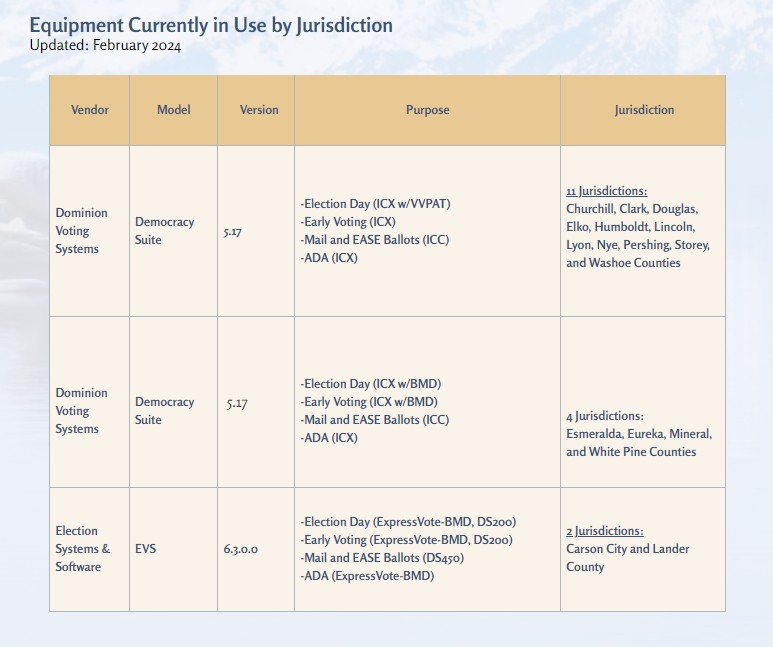
The VVPAT and the BMD-printed ballots have a QR code printed on them that summarizes a cast ballot. Whether for audit (VVPAT) or counting votes (BMD-printed), Nevada’s reliance on QR codes is problematic based on the evidence from Georgia that proves the software generating the QR codes strategically causes error periodically and consistently. In fact, Georgia’s Governor, Brian Kemp, signed SB 189 into law in May 2024, which phases out QR codes in elections in that state starting July 2026: With 2024 Presidential contest looming, Georgia governor signs new election changes into law – 11Alive News-Atlanta
An election or recount that relies on QR codes being read by machine can pass certification by the Clerk or Registrar of Voters, and thus pass certification by the Board too; the very QR codes found to be problematic in Georgia’s elections.
Washoe’s New Voter Check-in
Washoe County, after recent change, now uses TotalVote by Knowink for polling check-in, which is uncertified software with questionable integrity. According to reporter Joe Hoft, January 17, 2024.
TotalVote is centralized and hosted on the Microsoft Azure cloud – raising questions about cybersecurity, and TotalVote is uncertified, yet is handling parts of the election that must be performed on certified software.
BPro/KNOWiNK software has been proven to have allowed backdated voter registrations in Hawaii, unnatural injections of voter registrations in every county in New Mexico, and the KNOWiNK claims in its product information that election workers can override election results.
The new TotalVote check-in system relies on an Apple iPad with a stylus with wide rubber tip for voters to use to sign their name. The rubber tip of the stylus creates a fat line and is as clumsy to use as all such lower-end writing implements can be.
A digital pen with pressure tip is required to have any true comparison to one’s original signature. Instead, Washoe County’s reliance on a crummy stylus with rubber tip impedes accuracy of signature verification and turns it into a joke. It has the potential to slow check-in and increase wait times as voters try again and again to make a good signature and pass verification. If they don’t pass the signature test, they don’t get a ballot. And that’s a bad thing.
A Power to Investigate
The Georgia State Elections Board (SEB) recently, on August 6, 2024, replied to public complaints by requiring county election officials to make a “reasonable inquiry” before certifying election results. Quoting SEB member Janelle King, as reported by Brianna Lyman in The Federalist, August 8, 2024
“I think by supporting this rule what we’re saying is that we stand with those who have to sign legal documents stating that their information is accurate and ensuring they have what’s necessary to stand by that legal document,” King said during the hearing.
In Nevada, a contest of the election system may be based on a reasonable doubt pursuant to NRS 293.410(2f).
The county is required to ensure accuracy pursuant to NRS 293.387(2b), “Take account of the changes resulting from the discovery, so that the result declared represents the true vote cast.”
Accuracy in elections is enshrined in the Nevada Constitution at Article 2, § 1A (1b) and (7) and (10).
The county is required to investigate to prove accuracy pursuant to NRS 293.404(3):
“The recount must include a count and inspection of all ballots, including rejected ballots, and must determine whether all ballots are marked as required by law.
The county has a right to convene a grand or petit jury to audit pursuant to Nev. Const. art. 4, § 20.
There’s more, but you get the picture. Simply put, Nevada’s laws and Constitution codify a county’s right to conduct and regulate county and township races and ensure accuracy. Naturally, this involves the free exercise of a public official’s right to vote, particularly in matters of local concern, including approval, delay, or denial of the canvass of a recount of a county School Board race, for example. Legal authorities support these principles: Nevada Commission on Ethics v. Carrigan and Clark Cnty. V. City of Las Vegas.
Looking Ahead
A county’s right and duty to ensure accuracy in elections is paramount to voter trust. Without voter trust, voters may become disenfranchised and not vote to the detriment of a healthy republic.
- Procedural safeguards in a statewide recount must be “well calculated to sustain the confidence that all citizens must have in the outcome of elections.” Bush v. Gore, 531 U.S. 109 (2000).
- “Confidence in the integrity of our electoral processes is essential to the functioning of our participatory democracy.” Purcell v. Gonzalez, 549 U.S. 1, 4 (2006).
- Voting is “preservative of all rights.” Yick Wo v. Hopkins, 118 U.S. 356, 370 (1886).
Novel idea:
The county supplies the voter with a standard ballpoint pen and they use it to sign in a bound paper ledger (like we used to). The signature is then photographed by the iPad or scanned with a hand scanner for a high-resolution scan and that is compared on-screen to the voter’s original signature on file.
The simplicity and cost savings are indicated because a ballpoint pen costs pennies. It doesn’t run out of power. It takes no training to use. A ballpoint pen can’t be hacked. Though most important, use of a ballpoint pen closely matches the form of a voter’s original signature, enabling comparison of the artifacts necessary for forensic signature verification.
Novel idea:
The city or county may create separate ballots from statewide and federal races.
NRS 293.2694(2), “Each board of county commissioners and governing body of an incorporated city in this State may elect to use the ballots, including, without limitation, mail ballots, and return envelopes purchased by the Secretary of State.”
When the city or county uses their own ballot for local matters, the Secretary has no authority to intervene. If the city or county then wants to hire Clay Parikh and his buddies to verify the accuracy of our elections, or to convene a grand jury to investigate pursuant to Nev. Const. art. 4, § 20, who can then hire Clay Parikh and his buddies, Secretary Aguilar can scream and shout but it will be toothless.
Any and every election official in Nevada should be concerned about the evidence implicating electronic voting systems. I wish to believe that everyone wants accuracy and trust. Unfortunately, the system of checks-and-balances in place is being thwarted by the Democrat-controlled legislature and their ramrod, the Secretary of State Francisco Aguilar.
Vote Your Conscious
The city or county is the frontline of defense against the authoritarianism of Secretary Aguilar, heading into the 2024 general election. We must stand in support of our local officials to vote their conscious, to act in the best interests of their constituents, and to act to protect their rights and authority in all local matters as public officials, including county and township elections.
The Solomon Presentation
Mr. Solomon’s evidence is presented in the following slide deck as delivered at the Freedom Friday event.
